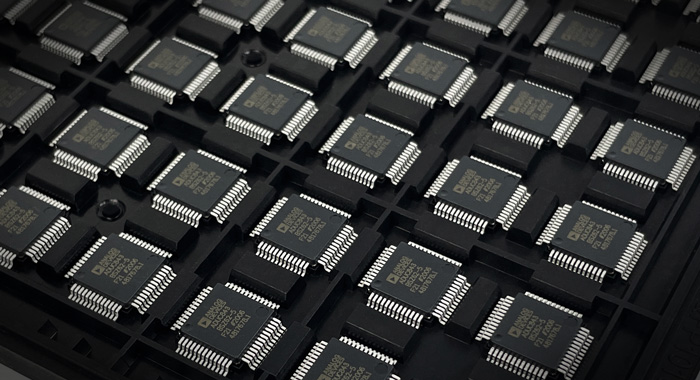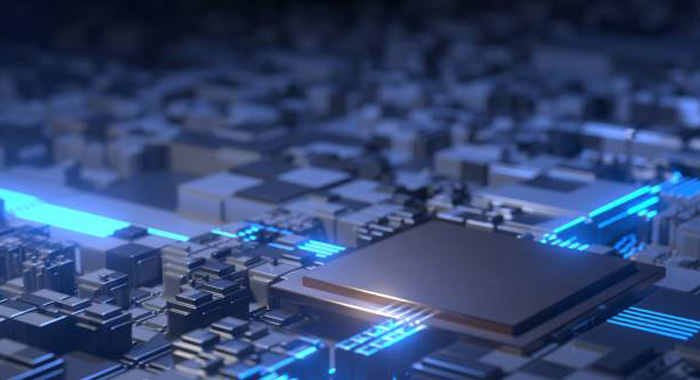With the rapid development of electrification, intelligence, networking, and sharing, electronic products are undergoing all-round changes. Automobiles are a generation of mobile smart terminals after consumer electronics, from internal combustion engines to electric drives, from distributed architectures to centralized control domains, etc. According to IHS Makit data forecast, the demand for automotive electronics continues to be strong, and the automotive semiconductor market is expected to reach US$110 billion in 2030.

Microcontroller
There are many chips used in the automotive field. For example, TI power management IC O3853QDCARQ1, which is used in automotive safety-related applications, has been on the hot list for a long time, and its price has dropped a lot recently, but it is still at a high level. TI's 32-bit MCU TMS320F28335PGFA is also a very popular model, and its price has returned recently. It is mainly used in industrial control, photovoltaics, and automobiles. NXP's pressure sensor MPXAZ6115AP has recently become popular, but the price and inventory are relatively stable.
MCU is the core of automotive electronic control systems, and its applications cover various fields such as body control, infotainment systems, driving assistance, and powertrain control. According to IC Insights, the market size of automotive-grade MCUs is expected to grow to US$8.8 billion in 2023. This means that with the popularity of smart electric vehicles, the demand for Microcontroller will usher in an exponential growth.
Those who are familiar with the procurement of electronic chips in the MCU market should know that the current global market competition for automotive MCU chips is relatively concentrated, mainly composed of manufacturers such as Renesas Electronics, Infineon, Texas Instruments, NXP, Microchip Technology, and STMicroelectronics. monopolized.
Applications of Microcontrollers in the Automotive Industry
Engine Control
Microcontrollers are used to control the fuel and air mix in the engine, to ensure the best performance and efficiency. Microcontrollers are also used to control the timing and ignition of the engine, as well as optimize the torque and response time. This allows cars to be more fuel efficient and have smoother engine performance, saving money at the pump.
Safety Systems
Many modern vehicles are equipped with safety systems such as lane departure warnings, adaptive cruise control, and blind spot detection. All of these systems rely on microcontrollers to detect objects and features in the environment, and then relay the information to the driver. These systems can help to prevent accidents and make driving safer.

Source: Internet
Infotainment Systems
Electronic Vehicles are equipped with infotainment systems that provide information about the car’s status and performance and even allow for the connection of external devices such as phones and tablets. Microcontrollers are used to manage and control these systems, ensuring that they are always up-to-date and functioning properly.
Self-driving Cars
Self-driving cars use microcontrollers to detect objects and features in their environment, and then make decisions on how to navigate the road safely. This technology is still in development but is one of the most exciting applications of microcontrollers in automotive.
Microcontrollers are a key component of modern cars, and will continue to be an important part of the automotive industry in the future.
Selection of the Microcontrollers
When it comes to selecting the right microcontroller for a project, there are many factors to consider that can help guide your decision. Microcontrollers are specialized computers found in various electronics and devices, from children’s toys and appliances to medical tools and sophisticated robotics. In order to pick the most suitable microcontroller for a project, there are a few key elements to keep in mind.
The first step is to identify the type of application the microcontroller will be used in. Microcontrollers come in a wide range of sizes and capabilities, and the application needs will help determine the type of microcontroller to select. For example, if you are building a remote-controlled car, you may need a MCU that is small, has a low power draw, and is capable of sending and receiving radio signals. On the other hand, if you are designing a medical device, you will likely need a MCU that is larger and more powerful.
The second step is to consider the memory requirements of the project. This term refers to the amount of data that the microcontroller needs to store and process in order to complete a task. Different microcontrollers have different memory capacities, so it’s important to select one that is capable of handling the data requirements of the project.
If your project requires the storage and processing of large amounts of data, you will need a MCU with a large memory capacity. If the project only requires small amounts of data, a smaller MCU with less memory may be a better choice.

Source: Internet
Thirdly, the input-output capabilities of the microcontroller should be taken into account. This refers to the number and types of input and output devices that the microcontroller will require, such as buttons, switches, and sensors. Depending on the complexity of the project, the MCU may need to have more or fewer input-output hardware components.
For example, a MCU used in a remote-controlled car may need to be compatible with several different types of motors, servos, and sensors.
Finally, the cost of the microcontroller should be considered. Different microcontrollers can vary greatly in price, so it is important to consider the cost in relation to performance. For instance, the STM32 is more expensive than the PIC32.
After considering the above factors and determining the part number to be purchased, another critical thing is to find a reliable purchase channel. Hard Find Electronics LTD. is an electronic components distributor for sourcing hard-to-find electronic parts. With an experience of over a decade in the industry, Hard Find Electronics has developed a comprehensive network of suppliers and customers.
With the rapid advancement of microcontroller technology, the automotive industry is set to benefit from enhanced safety and performance, as well as improved communication and data capabilities. From engine control, safety systems, infotainment systems, and self-driving cars, the use of microcontrollers in the automotive industry is set to revolutionize the way we drive and take automotive safety and performance to the next level. With reliable suppliers such as Hard Find Electronics, finding the right microcontroller for a project is a breeze.